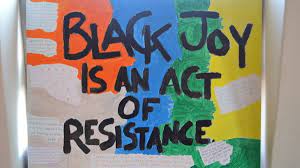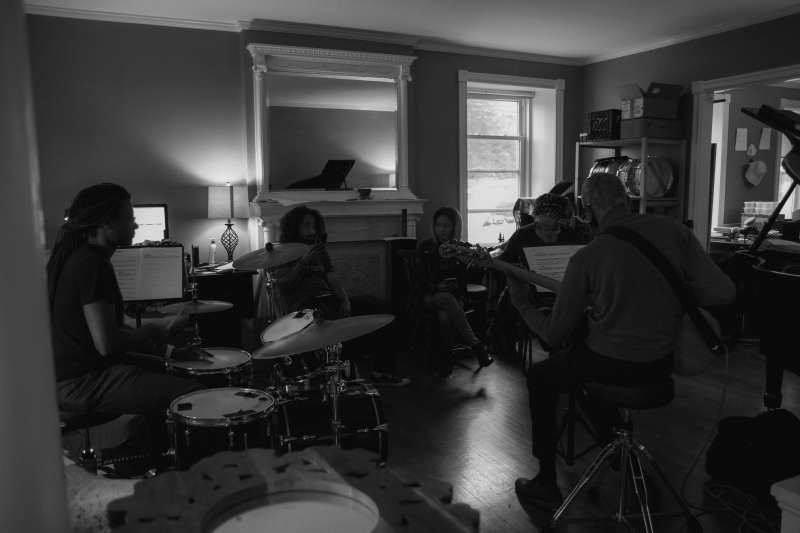BWW Previews: THE WHITNEY PROJECT - A CELEBRATION OF BLACK JOY at Delaware Theater Company
Learn more about this upcoming performance!
Do you know the term "Black joy?" Do you know what Black joy encompasses? I think it safe to surmise many White readers are not familiar with the terminology, let alone the who, what, and why of Black Joy. Now, I'm not about to give a lecture on Black joy because I am only just learning about the term and movement myself. What I will try to do is give a bit of insight through published articles written by others and my interview with local Wilmington Artivists, Jonathan Whitney and Jea Street, Jr., about the upcoming performance of The Whitney Project - A Celebration of Black Joy at Delaware Theater Company.
Black joy isn't new, the term simply hasn't been used in mainstream conversation until recently.
The origins of the Black joy concept likely date back to the start of Black history itself. For example, religious beliefs and traditions have always been part of Black culture and the first predominantly Black religious denominations were founded in America in the late 18th century, according to the Pew Research Center. For many in the Black community - especially those who are older - church is not only for worship but also a place of community and uplifting through praise and song. (Carlett Spike, AARP, 2/15/2021)

A young, Black queer Dominican-American creative, writer and educator from Uptown, NYC, woke up one morning in 2015 feeling "like a ton of bricks were on top of me...." Kleaver Cruz couldn't get out of bed that morning. It wasn't because he had a medical illness; it was due to his burden of an unexplained sadness.
I thought about how, earlier that year my family and I had experienced the sudden and tragic loss of my uncle Ali. I thought about how present I was for and to Black death and pain through my organizing work with various activist collectives in New York City, and the way I felt bombarded by these things on a daily basis. I decided that my Social media timeline needed some smiles amidst the sharing of important information, thoughts, art, photos and videos that can be upsetting and at its worst depressing and traumatizing. I then decided to take on a 30-day challenge to share photos of Black joy. - Kleaver Cruz
Thus, The Black Joy Project was born. The Black Joy Project, a digital and real-world affirmation that Black joy is resistance, became a travelling installation to better understand what Black joy means to Black people, and how it can be a source of healing, community building, and Black liberation.
When I ask Jonathan Whitney why he created The Whitney Project - A Celebration of Black Joy, the answer was simple and clear. "I have seen too many Black created shows based in pain and trauma. We're forced to create in a space of trauma." To Whitney, Black joy is a way of protecting and maintaining Black health while enduring the burden of fighting systemic racism and other injustices Black community members suffer on a daily basis.
Randal Jelks, a professor of American studies and African and African American studies at the University of Kansas, says the example set by his grandparents reinforced the concept of Black joy for him as a child. "They lived through the hardest part of Jim Crow, but they created joy for themselves." For example, interacting with others on Black Twitter, (the virtual Twitter community where Black people commune, share ideas and discuss relevant and important topics) and sharing memes and videos showcasing the commonalities of the Black experience inspire connection and even laughter. "Humor has always been an element of Black joy," Jelks says. "This is why we have so many comedians coming out of our community. Because of sadness we also know how to laugh." (Carlett Spike, AARP 2/15/2021)
With all that Black community members are being forced to deal with, Whitney asked himself the question, "Am I allowed to be happy?" The answer was and remains, "Yes." Whitney is not alone in his thinking.
Rather than romanticize the struggles of the Black diaspora, Black joy reveals Black folks' humanity and their simplest need to feel free and safe in their pursuit of happiness. One way of doing this is in allyship and solidarity against a future where joy has to be defined in a trauma-inflicted context. (Kim Pham, Voice of OC 2/1/2021)

Jea Street hadn't heard the term "Black joy" until recently, and is concerned that its use is becoming, "...too in vogue." Perhaps Jea is correct. I often worry that when new language is introduced, it can suffer from overexposure and lessen its meaning and effect. What concerns me about the term Black joy is that the uneducated will dismiss the activism component of Black joy, seeing only happiness, and make the erroneous conclusion that Black community members are doing just fine.
Sometimes Black joy is a directive. A necessity to survive. It's singing "Alright" in Ferguson streets among empty tear-gas canisters. It's jazz funerals. It's the way my uncle used to post up telling jokes at family members' wakes because that's how he knew how to make it through the night. Black joy is also in our nature. It's a survival instinct, a natural determination to be happy. To be Black, though, is to not know whether that joy is part of this basic human need or a revolt against being denied that need. Because the things that stop our joy are omnipresent. (David Dennis, Jr., Level 12/9/2020)
Cal State Fullerton African American studies professor, Mei-Ling Malone explains: "Black joy is an act of resistance. The whole idea of oppression is to keep people down. So when people continue to shine and live fully, it is resistance in the context of our white supremacist world." Whitney sees Black joy in similar terms. "We're used to seeing protests with people yelling, holding signs and marching. Black joy is an act of defiance."
When asked if The Whitney Project - A Celebration of Black Joy is relatable to a predominately White theater audience, "Totally," Whitney replied, "It's an experience you'll view through your lens and take away what reaches you." Street added, "It's totally relatable to everyone. If you listen to Grandma's Hands and don't get that feeling thinking about your own Grandma, then your soul is dead."
Personally, I can't wait to see The Whitney Project - A Celebration of Black Joy. Not only do I call many of the Artists involved friends, (and I do my very best to support for their endeavors by attending performances), but the genesis of the piece is absolutely inspiring, and its statement requires everyone's full attention.
The Whitney Project - A Celebration of Black Joy has a very limited run at Delaware Theater Company - July 13 through July 17. If you don't already have tickets, get them now. Come learn, experience and share in the movement that is Black joy.
Delaware Theater Company
200 Water Street
Wilmington, DE 19801
302.594.1100 - Box Office
www.delawaretheatre.org
The Whitney Project is a jazz band assembled by drummer and composer Jonathan W. Whitney. This show features acclaimed singers Jea Street, Jr., and Nadjah Nicole (finalist on The Voice) and is executive produced by storyteller TAHIRA. Through storytelling and music, it celebrates the joy that can be found in the lives of people of color throughout their history in America. The joy found at churches, BBQs, weddings, births, chance meetings on the street, within Children at Play and, yes, even going home services, has served as Black America's greatest protest.
Comments

Videos

